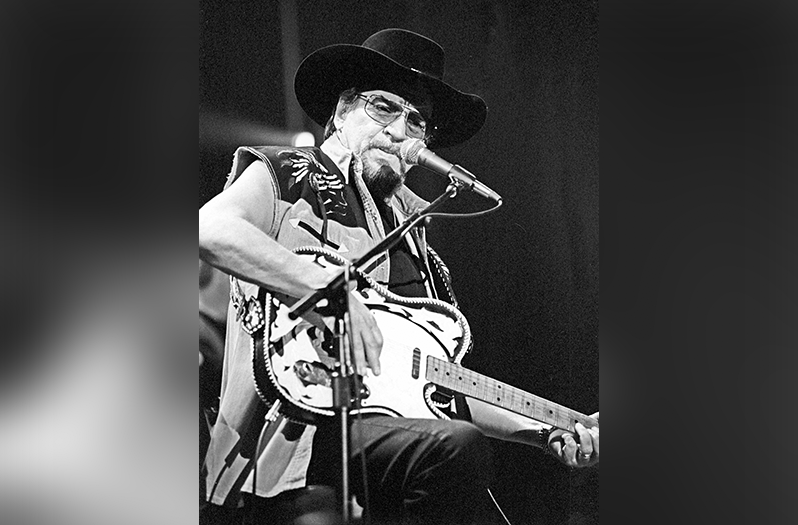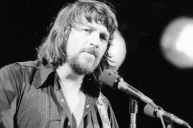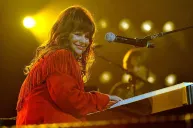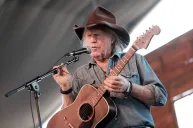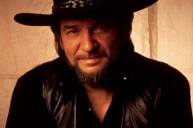81 years ago today in the small West Texas town of Littlefield, Waylon Jennings was born. Over the course of his illustrious career, he'd release some 40+ solo albums, 18 collaborative efforts, and another five live albums. While not every album Jennings recorded was a bonafide hit or made a mark on the industry, he undoubtedly delivered some of the greatest albums in country music history.
Videos by Wide Open Country
In short, Jennings' best have had an immeasurable impact on not just his peers and contemporaries, but also set the standard for future generations of weighty singer-songwriters, country-rock ramblers, honky-tonk aspirations, and barrel-chested baritone vocalists. While he'd often question being called the leader of the outlaw country movement, there's very little doubt that his style and sound revolutionized the way people thought about country music and just exactly how an album should sound and be recorded. Often, his albums bucked against the conventions of Nashville's norms.
While his larger than life persona seemed to fuel Jennings, his iconic delivery was as versatile a voice as we've ever seen. On one hand, he could be sharp and full of swagger. At the drop of a hat though, Jennings could transition into a delicate storyteller full of heartache and distress. There's nuanced infliction Regardless of what he was doing, he oozed with effortless confidence and made you believe he was all of these vivid characters in song — no matter who he was playing.
Below, we visit some of Jennings' greatest solo albums in his career. Mind you, we've omitted all collaborative efforts involving Jennings (Maybe we'll do that countdown sometime in the near future). That means no Waylon & Willie (with Willie Nelson), Leather & Lace (with Jessi Colter), Highwayman (The Highwaymen), the ever-underrated White Mansions (with Colter, Johnny Cash, and John Dillon) or the seminal Wanted! The Outlaws (with Nelson, Colter and Tompall Glaser).
Still, there's a hefty and worthy load of immeasurable quality to sift through in the solo Jennings discography. Here are 10 of his absolute best.
10. A Man Called Hoss
In 1987, Jennings delivered an underrated gem with A Man Called Hoss. Long after his '70s prime, A Man Called Hoss finds Jennings as an elder statesman in the country music scene. Rather than going down old roads note for note, Jennings reminiscences about his humble West Texas roots and rise through the ranks and glory days as Nashville's rebel. Songwriter Roger Murrah shares the writing duties on the 11 tracks, which are split up into chapters of Jennings life.
Essential Listening: "Littlefield," "If Ole Hank Could Only See Us Now," "My Rough and Rowdy Days"
9. Ladies Love Outlaws
While Jennings said he was dissatisfied with Ladies Love Outlaws, often saying it was an unfinished product and used just used his scratch vocals, the album is still one of his finest outputs. At the time, he was at odds with RCA Records and even contemplated retiring from music altogether. Still, there's a certain charm and warmth to the album '72 album. His version of Mickey Newbury's "Frisco Depot (San Francisco Depot)" and Hoyt Axton's "Never Been to Spain" are some of his best—even if the Nashville Rebel wasn't fully content with the album.
Essential Listening: "Never Been to Spain," "Frisco Depot (San Francisco Depot)," "Under Your Spell Again"
8. I've Always Been Crazy
One of Jennings best qualities was always his heightened self-awareness and ability to poke fun at himself at times. While the vast majority of the '70s had Jennings stoking the flames and selling an outlaw image, '78's I've Always Been Crazy becomes a semi-meta moment within the movement. Opening songs "I've Always Been Crazy" and "Don't You Think This Outlaw Bit's Done Got Out of Hand," both penned by Jennings, do a little bit of curtain pulling and admitting that the gig was up. Unsurprisingly, the two became staples for Jennings. Even while the back half is filled with known hits such as Johnny Cash's "I Walk the Line," Merle Haggard's "Tonight the Bottle Let Me Down" and a medley of Buddy Holly classics, Jennings doesn't mail in the effort and sings them as though they're brand new to an audience.
Essential Listening: "I've Always Been Crazy," "Don't You Think This Outlaw Bit's Done Got out of Hand," "Whistlers and Jugglers"
7. The Taker/Tulsa
Released in '71, The Taker/Tulsa is a seminal moment in Jennings career. At this point, he's really finding his footing as a vocalist and artist. The selection of four Kris Kristofferson songs sets the entire poetic tone for the album and in many respects, feels much more like a folk ballad album than a country record. Songs like "The Taker" and "Lovin' Her Was Easier (Than Anything I'll Ever Do Again)" really see Jennings come into his own with passionate takes on both. You see all the hints at Jennings slowly transitioning into a bonafide force with something to say that feels different from the status quo.
Essential Listening: "The Taker," "Lovin' Her Was Easier (Than Anything I'll Ever Do Again)," "(Don't Let the Sun Set On You) Tulsa)"
6. Waylon Sings Ol' Harlan
While it was incredibly popular for artists to cover another singer-songwriter for the duration of an entire album, Jennings only did it twice in his career — '67's Waylon Sings Ol Harlan and '92's Ol' Waylon Sings Ol' Hank. Jennings was a major fan of Harlan Howard, saying that he ended up recording over 70 of Howard's songs over the course of his career. Here, Jennings delivers a steady dose of Howard's best and best unknown. Hits like "Heartaches By the Number" and "I've Got a Tiger By the tail" are sprinkled in with some of Howard's greatest gems.
Essential Listening: "She Called Me Baby," "The Everglades," "Beautiful Annabel Lee"
5. Lonesome, On'ry and Mean
While Jennings had a penchant for heartbreakers that left him broken and beat, he could be the bearer of bad news with the best of them all the same. '73's Lonesome, On'ry, and Mean is perhaps his greatest collection of brutally honest low-blows and raw criticism. Songs such as "You Can Have Her" and "Pretend I Never Happen" are almost cavalier shrugs in response to good love gone bad. He absolutely takes hold of Steve Young's "Lonesome, On'ry and Mean" and belts out the rambler with a gritty snarl. "San Francisco Mabel Joy," another Newbury cut, proves once again he could transform into a gentle narrator with ease.
Essential Listening: "Lonesome, On'ry and Mean," "Good Time Charlie's Got the Blues," "You Can Have Her"
4. Are You Ready for the Country
Willie Nelson may have been the free spirit cowboy who merged the rednecks and hippies during the '70s, his counterpart balance was Jennings' hard-edged rock & roll star. It's in part what made their collaborative efforts so timeless. '76's Are You Ready for the Country was perhaps Jennings most rock & roll moment. It's chock-full of piercing honky-tonk guitars and songs penned by the likes of Neil Young and Dr. Hook. Even some of its more somber moments, such as "Old Friend," find Jennings talking about old rock stars like friend Buddy Holly. Still, one of the album's most definitive traits is the fact that it was recorded out in Hollywood, a major deflection to the Nashville standard at the time.
Essential Listening: "Are You Ready for the Country," "Them Old Love Songs," "MacArthur Park (Revisited)," "A Couple More Years," "Old Friend"
3. The Ramblin' Man
Much like I've Always Been Crazy, The Ramblin' Man finds Jennings kicking things off with two songs ("I'm a Ramblin' Man" and "Rainy Day Woman") that just set the rough and rowdy tone of the 1974 record. There's a bold swagger in Jennings delivery throughout that simply exemplified Jennings boisterous baritone. Again, even when he takes a stab at an already well-known classics such as The Allman Brothers' "Midnight Rider," Jennings belts it out as though he wrote it himself right on the spot. Amazingly, Jennings didn't just release The Ramblin' Man in '74 — he had released This Time just a few months prior (which could have easily been included).
Essential Listening: "I'm a Ramblin' Man," "Rainy Day Woman," "Oklahoma Sunshine," "Amanda"
2. Honky Tonk Heroes
Perhaps the most mythic of Jennings albums, Honky Tonk Heroes plays out like a greatest hits album—namely, because it pretty much is one of Billy Joe Shaver songs. As many have proclaimed, what made Honky Tonk Heroes such a powerful moment was Shaver's unabashedly candid songwriting and Jennings sincere delivery. Still, the story behind the making of the album is nearly as legendary as the album itself. While Jennings had been nearly a decade since his RCA Records debut Folk-Country (his Waylon at JD's was released by Sound Limited), it wasn't until '73's Honky Tonk Heroes that he had finally found the right combination of songs and style. By all means, it's a watershed moment for Texan singer-songwriters like Shaver and the poster child for the outlaw rebellion happening in country music.
Essential Listening: "Old Five and Dimers (Like Me)," "You Asked Me To," "Ain't No God In Mexico," "Black Rose"
1. Dreaming My Dreams
'75's Dreaming My Dreams is pound for pound, Jennings' best solo album. There's a high standard of quality in songwriting and performance throughout the chart-topping hits, the hidden gems, and b-sides. Songs such as Roger Miller's "I've Been a Long Time Leaving (But I'll Be a Long Time Gone)" and Cowboy Jack Clement's "Let's All Help the Cowboys (Sing the Blues)" (who also co-produced the album with Jennings) carry just as much clout to the album's most successful singles such as "Are You Sure Hank Done It This Way" or "Bob Wills Is Still the King." The beauty behind Dreaming My Dreams is just how much of the record is a salute to Jennings' heroes — Hank Williams, Bob Wills, Jimmie Rodgers and the ever lonesome cowboy of the American West.
Essential Listening: "Are You Sure Hank Done It This Way," "Waymore's Blues," "Dreaming My Dreams with You," "Bob Wills Is Still the King"
